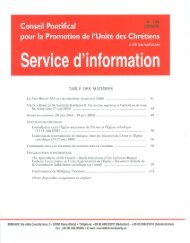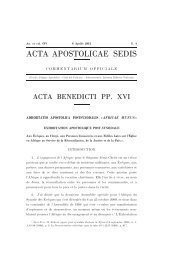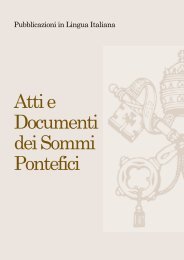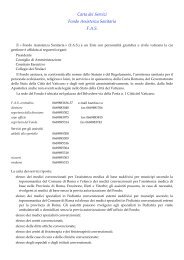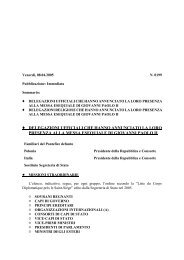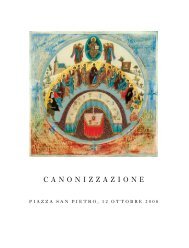ACTA APOSTOLICAE SEDIS - La Santa Sede
ACTA APOSTOLICAE SEDIS - La Santa Sede
ACTA APOSTOLICAE SEDIS - La Santa Sede
Sie wollen auch ein ePaper? Erhöhen Sie die Reichweite Ihrer Titel.
YUMPU macht aus Druck-PDFs automatisch weboptimierte ePaper, die Google liebt.
Acta Benedicti Pp.XVI 699<br />
and their equivalents, such as Territorial Prelatures, Apostolic Vicariates,<br />
Military Ordinariates, etc.) throughout the world, is not like that of a modern<br />
State with a central government nor is it comparable to that of a federal<br />
State.<br />
In the Church, the Bishops are neither representatives nor delegates of<br />
the Roman Pontiff but of Christ (cfr. Second Vatican Council, Dogmatic<br />
Constitution on the Church Lumen Gentium, No. 27), though, as Catholic<br />
Bishops, they are to act in communion with the Bishop of Rome and the<br />
other Bishops throughout the world; this is the principle of “episcopal<br />
collegiality”, as described by the Second Vatican Council (cfr. ibid, Nos.<br />
21-25). Hence, while the diocesan Bishop is to act in conformity with<br />
universal canonical legislation, it is he who is primarily responsible for<br />
penal discipline in his Diocese, just as he is responsible for the concrete<br />
actuation in his Diocese of the liturgical and sacramental life of the Church<br />
in conformity with the universal law governing liturgy and the sacraments<br />
(cfr. ibid. No. 27).<br />
In the Catholic Church, this particular relationship among the various<br />
Dioceses within the one Church is expressed by the term “ecclesial communion”<br />
and it has been particularly evident since the Second Vatican Council,<br />
which placed special emphasis on the proper responsibility of each Bishop. In<br />
order to coordinate better their activities at the national level, Episcopal<br />
Conferences were created to promote initiatives consonant with the needs<br />
of each national territory, while respecting the autonomy of individual<br />
Bishops in their Dioceses. Without having to refer either to the Holy See<br />
or to the Episcopal Conference, and provided he respects the requirements of<br />
the universal law of the Church and the just laws of the State, each individual<br />
Bishop has the right and the obligation to take whatever initiative he deems<br />
necessary in order to promote charity and justice in his Diocese.<br />
In this context, with due respect for the prerogatives and responsibilities<br />
of individual Bishops, the Holy See has the responsibility of ensuring the<br />
unity of faith, sacraments and governance in the Church, and the maintaining<br />
and strengthening of ecclesial communion. Where this unity and ecclesial<br />
communion are compromised, the Roman Pontiff may act directly or<br />
through the offices of the Roman Curia to rectify matters.





![AAS 01 [1909] - La Santa Sede](https://img.yumpu.com/51456523/1/180x260/aas-01-1909-la-santa-sede.jpg?quality=85)
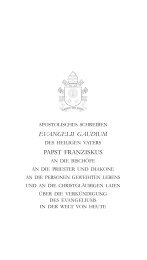
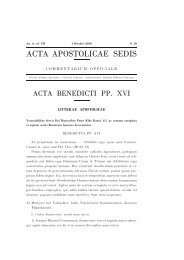

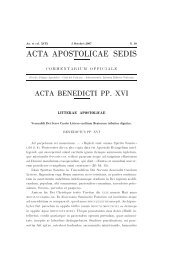
![AAS 20 [1928] - La Santa Sede](https://img.yumpu.com/19772818/1/180x260/aas-20-1928-la-santa-sede.jpg?quality=85)
